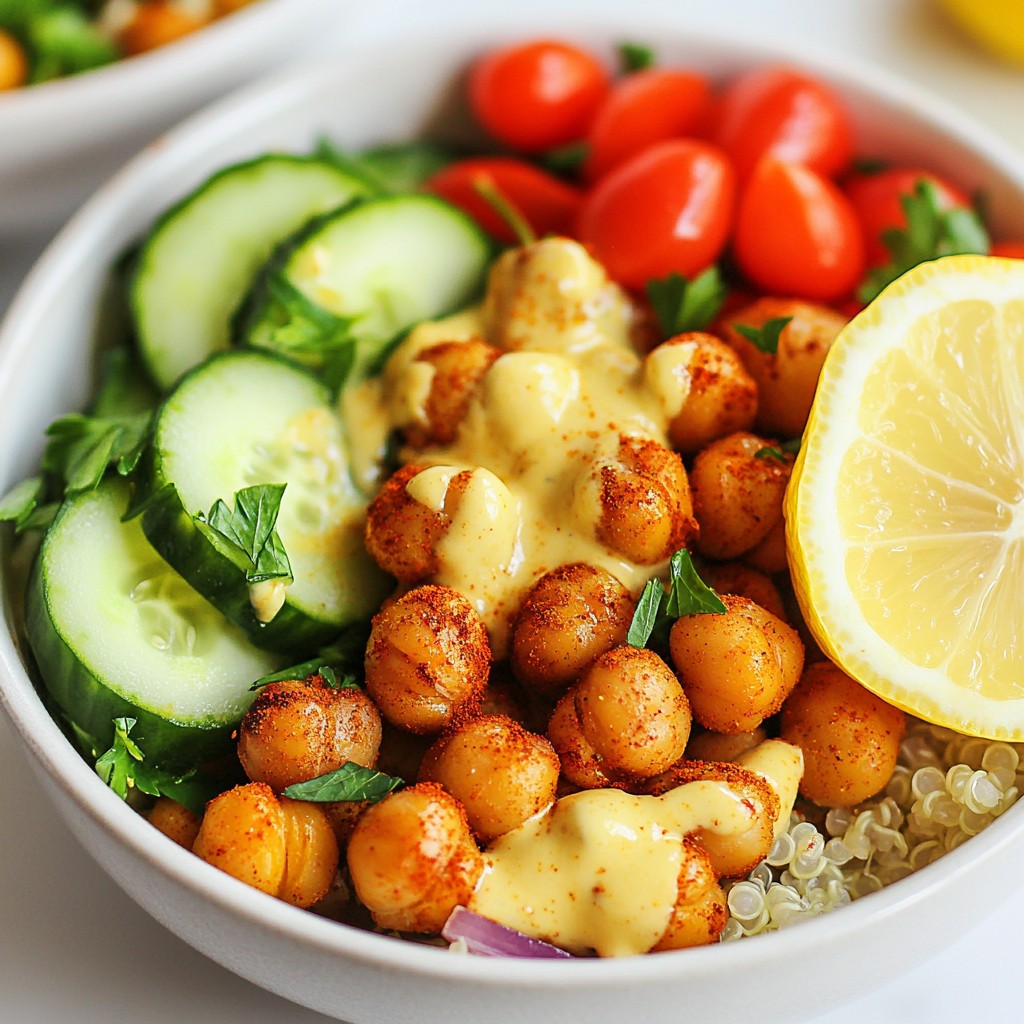Are you ready to enjoy a fresh and tasty dish? This Sesame Ginger Noodle Salad is a perfect blend of flavors! With rice noodles, crisp veggies, and a zesty dressing, it’s a delightful meal for any occasion. In this guide, I’ll share easy steps and tips to make it your own. Let’s dive into the ingredients and create a salad that’ll impress everyone!
Why I Love This Recipe
- Fresh and Flavorful: This salad is bursting with vibrant colors and fresh ingredients that make it a joy to eat.
- Quick and Easy: With a total prep time of just 20 minutes, this recipe is perfect for busy weeknights or last-minute gatherings.
- Customizable: You can easily swap out vegetables or proteins to suit your taste preferences or dietary needs.
- Healthy and Nourishing: This salad is packed with nutrients and is a great way to incorporate more vegetables into your diet.
Ingredients
Main Ingredients
– 8 oz rice noodles
– 1 tablespoon fresh ginger, grated
– 1 cup shredded carrots
– 1 cup red cabbage, thinly sliced
– 1 bell pepper (red or yellow), thinly sliced
– ½ cup green onions, chopped
I love using rice noodles in this salad. They are light and soak up flavors well. Fresh ginger adds a great zing. The vegetables bring color and crunch, making the dish vibrant. Carrots add sweetness, while red cabbage gives a nice crunch. Bell peppers add a touch of brightness. Finally, green onions lend a mild onion flavor.
Dressing Ingredients
– 2 tablespoons sesame oil
– 3 tablespoons soy sauce (or tamari for gluten-free)
– 1 tablespoon honey or maple syrup
– 1 tablespoon rice vinegar
The dressing is key to this salad. Sesame oil gives a nutty flavor. Soy sauce or tamari provides saltiness. Honey or maple syrup adds sweetness. Rice vinegar brings acidity, balancing all the flavors. Whisk these together, and you have a perfect dressing.
Garnish Options
– ¼ cup sesame seeds, toasted
– Fresh herbs (cilantro or parsley)
Garnish makes your dish pop. Toasted sesame seeds add a nice crunch. Fresh herbs like cilantro or parsley brighten the dish. They also add fresh flavors that complement the salad well. Don’t skip this step; it makes a difference!

Step-by-Step Instructions
Cooking the Noodles
First, boil a large pot of water. When the water is boiling, add 8 oz of rice noodles. Cook them according to the package instructions. This usually takes about 4 to 6 minutes. Once cooked, drain the noodles in a colander. Rinse them under cold water to stop the cooking process. This step keeps the noodles firm and prevents them from sticking together.
Preparing the Dressing
In a small bowl, whisk together the dressing ingredients. Combine 2 tablespoons of sesame oil, 1 tablespoon of grated fresh ginger, 3 tablespoons of soy sauce (or tamari for gluten-free), 1 tablespoon of honey or maple syrup, and 1 tablespoon of rice vinegar. Whisk until all the ingredients are well mixed. Set this aside for later.
Combining Ingredients
Grab a large mixing bowl and add the vegetables. Put in 1 cup of shredded carrots, 1 cup of thinly sliced red cabbage, 1 thinly sliced bell pepper (red or yellow), and ½ cup of chopped green onions. Toss these veggies together to mix them well.
Next, gently fold in the cold rice noodles from earlier. Pour the dressing over the noodle and vegetable mix. Toss everything together until the noodles and veggies are evenly coated in the dressing. For a finishing touch, sprinkle ¼ cup of toasted sesame seeds over the top and toss gently again. Transfer the salad to a serving platter or individual bowls. You can add fresh cilantro or parsley for extra flavor and color.
Pro Tips
- Fresh Ingredients: Use fresh vegetables for the best flavor and crunch. The vibrant colors and textures will make your salad visually appealing and delicious.
- Chill the Noodles: After rinsing the noodles, let them chill in the refrigerator for a few minutes. This enhances the salad's freshness and makes it more enjoyable to eat.
- Customize Your Veggies: Feel free to swap in your favorite vegetables like snap peas or cucumbers. This recipe is versatile and can be adjusted based on what's in season or available.
- Make Ahead: This salad can be made ahead of time. Just keep the dressing separate until serving to prevent the noodles from becoming soggy.
Tips & Tricks
Cooking Tips
– How to avoid overcooking noodles: Watch your timer closely. Rice noodles cook fast, usually in 4-6 minutes. To avoid mushy noodles, taste them a minute before the time is up. If they feel firm, drain them right away. Rinse them under cold water to stop cooking. This keeps them perfect and chewy.
– Ensuring the dressing is adequately mixed: Use a small bowl to mix the dressing first. Whisk together sesame oil, ginger, soy sauce, honey, and rice vinegar well. Make sure all the ingredients blend together. Pour the dressing over the salad right before serving. This keeps the veggies crisp and fresh.
Serving Suggestions
– Ways to serve: You can serve this salad in a big bowl or on a platter. For a more personal touch, use individual bowls for each guest. This makes it easy for everyone to enjoy.
– Recommended side dishes: Pair this salad with grilled chicken, shrimp, or tofu. You can also serve it with spring rolls or dumplings to create a fun, shared meal.
Flavor Enhancements
– Adding proteins: If you want to make this salad more filling, add proteins like grilled chicken, shrimp, or tofu. Cook the protein separately, then add it to the salad before serving. This adds great taste and makes it a full meal.
– Incorporating additional herbs or spices: To make your salad unique, try adding fresh herbs like mint or basil. You can also sprinkle in red pepper flakes for heat. These simple changes make your salad more exciting.
Variations
Gluten-Free Options
You can make this salad gluten-free by using tamari instead of soy sauce. Tamari is a great choice for those who cannot have gluten. It has a similar taste to soy sauce but is made without wheat. Just swap it in your recipe. This simple change keeps all the flavor intact while catering to your dietary needs.
Vegan Adaptations
If you want a vegan salad, just replace honey with maple syrup. Maple syrup adds a sweet touch without any animal products. It blends well with the dressing. This small swap makes the dish suitable for everyone. You still get that nice sweetness in every bite.
Other Vegetable Additions
Feel free to get creative with seasonal vegetables. Adding snap peas, cucumber, or radishes can enhance the crunch. You can also use zucchini or bell peppers in different colors for visual appeal. Mixing colors makes the dish more inviting.
You might also consider swapping ingredients based on what you have on hand. For example, use broccoli instead of cabbage or add avocado for creaminess. This flexibility allows you to customize the salad to your taste. Enjoy experimenting!
Storage Info
Short-Term Storage
After enjoying your sesame ginger noodle salad, store leftovers in an airtight container. Keep it in the fridge for up to three days. Make sure the salad is cool before sealing to prevent condensation. This keeps the noodles fresh and crunchy. If the salad seems dry, add a splash of dressing before serving.
Long-Term Storage
For longer storage, you can freeze the noodles and salad. However, the vegetables do not freeze well. To freeze, separate the noodles and dressing from the veggies. Place the noodles in a freezer bag and seal tightly. They can last for up to two months in the freezer. When ready to eat, thaw in the fridge overnight.
Reheating Tips
When you reheat the noodles, use a gentle method. Place them in a pan with a little water over low heat. Stir frequently to avoid mushiness. If you want to keep the salad fresh, enjoy the veggies cold. Add them back after reheating the noodles. This keeps everything tasty and crunchy.
FAQs
How long do leftovers last?
Leftovers of Sesame Ginger Noodle Salad last about three to five days in the fridge. Make sure to store the salad in an airtight container. This keeps the salad fresh and tasty. If the salad has dressing mixed in, it may not last as long. The noodles can soak up the dressing and become soggy over time.
Can I make this salad ahead of time?
Yes, you can make this salad ahead of time. To do this, prepare the salad without the dressing. Store the noodles and vegetables in the fridge. When you are ready to eat, mix in the dressing. This keeps the salad crunchy and fresh.
What are some common substitutions?
You can easily swap some ingredients in this salad. Here are a few ideas:
– Rice noodles: Use soba or whole wheat noodles if you prefer.
– Soy sauce: Tamari is a great gluten-free option.
– Honey: Maple syrup works well for a vegan choice.
– Veggies: Try using zucchini, cucumbers, or snap peas for variety.
These swaps make the salad fit your taste or dietary needs.
This post covered a fresh and tasty rice noodle salad. We explored key ingredients like rice noodles, fresh veggies, and a flavorful dressing. I shared step-by-step instructions, tips, and variations to make it your own.
With easy storage and reheat advice, you can enjoy this dish later. Whether you want to please your family or impress friends, this salad is a hit. Now, get cooking and enjoy your delicious creation!







